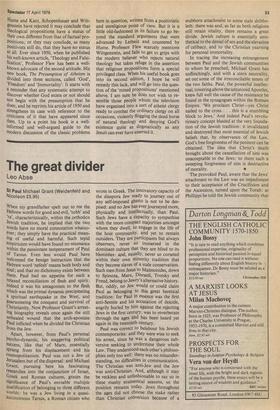The great divider
Leo Abse
St Paul Michael Grant (Weidenfeld and Nicolson £5.95)
When my grandfather spelt out to me the Hebrew words for good and evil, 'tobh' and ra', characteristically, within the orthodox Jewish tradition, he implied that the two words have no moral connotation whatsoever; they simply have the practical meaning of useful and harmful. Such tepid empiricism would have found no resonance Within the passionate temperament of Paul of Tarsus. Even less would Paul have welcomed the benign instruction that the Hebrew word 'nefesh' means both body and soul; and that no dichotomy exists between them. Paul had no appetite for such a relaxed reconciliation of flesh and spirit: indeed it was his antagonism to the flesh Which was the primal dynamic precipitating a spiritual earthquake in the West, and guaranteeing the conquest and survival of Christianity. Now Professor Grant's arresting biography reveals once again the still unhealed wound that the arch-apostate Paul inflicted when he divided the Christian from the Jew.
Apart, however, from Paul's personal Psycho-dynamic, his staggering political success, like that of Marx, essentially sprang from his displacement and his cosmopolitanism. Paul was not a Jew of Jerusalem but of the dispersal: and Michael Grant, pursuing here his fascinating researches into the conjunction of Israel, Greek and Roman cultures, grasps the significance of Paul's enviable multiple qualification of belonging to three different worlds: he was a Jew living in a quasiautonomous Tarsus, a Roman citizen who
wrote in Greek. The innovatory capacity of the diaspora Jew ready to journey out of any self-imposed ghetto is not to be despised: and no Jew has ever journeyed more, physically and intellectually, than Paul. Such Jews have a capacity to sympathise with the more compact majorities amongst whom they dwell, to engage in the life of the host community, and yet to remain outsiders. They are participants but always observers, never so immersed in the dominant culture that they are blind to its blemishes: and, equally, never so corseted within their own minority tradition that they become slaves of a stale conservatism. Such men from Jesus to Maimonides, down to Spinoza, Marx, Disraeli, Trotsky and Freud, belong to Jewry's alternative history. But, oddly, no Jew would or could claim Paul as belonging to this great heretical tradition: for Paul in essence was the first anti-Semite and his accusation of deicide, angrily hurled by him against the rejecting Jews in the first century, was to reverberate through the ages and has been heard yet again in the twentieth century.
Paul was correct to belabour his Jewish contemporaries: and they were wise to seek his arrest, since he was a dangerous subversive seeking to undermine their whole Law. They understood each other's philosophies only too well: there was no misunderstanding, no difficulties in communication. The Christian was anti-Jew and the Jew was anti-Christian. And, although it may be reckless and unfashionable to say so in these mushy ecumenical seasons, so the position remains today. Jews throughout the ages did not choose the stake rather than Christian conversion because of a
stubborn attachment to some stale shibboleth: there was and, as far as both religions still retain vitality, there remains a great divide. Jewish culture is essentially antithetical to the denial of sex and the elevation of celibacy, and to the Christian yearning for personal immortality.
In tracing the increasing estrangement between Paul and the Jewish communities to whom he preached, Michael Grant has unflinchingly, and with a stern neutrality, set out some of the irreconcilable tenets of the two faiths. Paul, the powerful intellectual, towering above the untutored Apostles, knew full well the cause of the resistance he found in the synagogues within the Roman Empire. 'We proclaim Christ—yes Christ nailed to the cross . . . this is a stumbling block to Jews.' And indeed Paul's revolutionary concept blasted at the very foundation of the Jewish tradition: it invalidated and destroyed that most essential of Jewish beliefs that, by observance of the Law, God's free forgiveness of the penitent can be obtained. The idea that Christ's death brought about the cancellation of sins was unacceptable to the Jews: to them such a sweeping forgiveness of sins is destructive of morality. • The provoked Paul, aware that the Jews' attachment to the Law was an impediment to their acceptance of the Crucifixion and the Ascension, turned upon the Torah : at Phillippi he told the Jewish community that


































 Previous page
Previous page